 Introduction:
Introduction:
AMD has released another slew of processors to the market focused on faster clock speeds with a cheaper price tag. One of these processors is the dual core Phenom ™ II X2 560 Processor code named “Calisto” which runs at stock at 3.3GHz out of the box. The 560 X2 is listed as the Black Edition which signifies the processor is multiplier unlocked and overclock capable. We will test the headroom of the new Phenom II 560 later in this review. This cpu is targeted towards enthusiasts who are looking for an affordable processor which is bred for overclocking, the 560 BE comes unlocked at 3.3GHz and is dual-core on the same die as the quad-cores like the Phenom™ II X4 940 BE. There are still a number of games on the market today which do not benefit from more than two processor cores and thus many gamers do not realize a benefit in game from a quad core or higher processor. We have dropped the Phenom II X2 560 into our sinister Asus Crosshair IV Formula motherboard and hooked up the ROG connect port for some real overclocking testing read on to see what we uncovered.
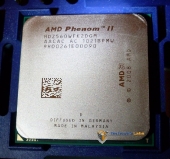 |
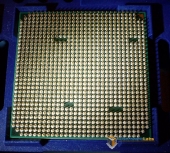 |
Features:
This is one of several processors to be launched today and available on the market. The remaining processors and pricing in this lineup are:
| Processor | AMD Phenom II X2 |
| Model Number | 560 |
| Part Number | HDZ560WFK2DGM |
| Socket Type | AM3 |
| Wattage | 80 |
| Speed | 3.3 |
| Bus Speed | 200.7 MHz |
| L2 Cache Size | 1000 |
| Manufacturing Tach(CMOS) | 45nm SOI |
| Total Cache (L2+L3): | 7MB |
| L1 Cache | 64K of L1 instruction and 64K of L1 data cache per core (256KB total L1 per processor) |
| L2 Cache | 512KB of L2 data cache per core (1MB total -L2 per processor) |
| L3 Cache | 6MB (shared) |
A Closer Look:
The AMD Phenom ™ II X2 560 BE has an estimated retail price tag of $105, the closest competitor from Intel is the E8400 Wolfdale at3.0 GHz which has (at the time of this review) a price of $169. By the time you have hit the i5 and i7 processors you are spending a minimum of $200. A money minded consumer would see this as a no brain choice.
Our Test Rig:
| Asus Crosshair IV Formula Motherboard |
| 4GB of OCZ DDR3 |
| OCZ Solid State Drive (Solid 2 Series 60GB |
| Tuniq 1200 Watt PSU |
| NZXT – Hades Crafted Series Case |
| Geforce GTX 280 |
| Domino ALC Liquid Cooling by CoolIT Systems |
Software Parameters
| Windows 7 X64 Home Premium N |
| Geforce driver 8.17.12.5896 |
| All Updates |
| ASUS ROG Connect |
Benchmark and Informational Software Used:
| SiSoft Sandra |
| Whetsctone |
| ScienceMark |
| PassMark |
| CPU-Z |
Overclocking:
Overclocking was done via the ROG connect which is built into the ASUS Crosshair IV Formula Motherboard. This is a feature that anyone who into overclocking should experience at least once. With the ROG connect software installed on a neighboring PC (in our case we used an HP mini), we were able to quickly adjust the voltages of the motherboard and processor in a matter of seconds on the fly and save the configuration to the HP mini for when we pushed the processor too far and the PC locked up, we were able to quickly pull up the last saved settings and load them up and use them as a baseline to adjust in a different way. This process slices hours off what otherwise could take days of trial and error.
| ROG Connect at Stock voltages | ROG connect Overclocked to 4.01GHz |
| AMD Phenom II X2 560 at Stock | AMD Phenom II X2 560 OC to 4.1GHZ |
|
Single Core overclocked to 4.5GHz. |
We were able to overclock the Phenom II 560 all the way up to 4.3 at one point, but it was becoming unstable to the point that only the WinRAR benchmark would run. Other benchmarks would lock up the system, so the most stable speed we were able to obtain with both cores was at 4.01GHz. When I disabled one of the cores I was able to bump the speed up to 4.5GHz before a crash dump. When playing DIRT2 with just one core at 4.5GHz the game was a little sluggish compared to running the same processor with dual core as 3.3GHz. So unless you have a program or game which does not utilize dual cores we suggest you leave the second core enabled, For reference we were able to get the AMD 560 up to 4.5GHz (unstable at 4.8GHz) on air cooling. Given an adequate water cooling system we are sure that this processor would have gone much further and still be stable.
BenchMark Testing:
All of the above SiSoft benchmarks above were completed at the stock 3.3GHz speed.
| SiSoft Multimedia benchmark at stock speeds | Sisoft Multimedia benchmark at 4.1GHz |
We were able to get the multimedia benchmark to run while overclocking the processor at 4.1 GHz, but strangely the other benchmarks would not run. The 560 X2 did very well for a dual core in comparison to other dual cores as you can see above. Also for the listed $105, you just can’t touch this performance to cost ratio. Additionally consider that we were able to take this $105 processor from stock 3.3GHz to 4.01GHz with a few clicks of a mouse, there is simply no other processor in the same ball park.
Whetstone:
| Stock 3.3GHz | Overclocked to 4.13GHz |
The Whetstone benchmark results for the stock 3.3GHz comes in with a really respectable 2849003 score. The overclocked 4.13GHz score is really an eye opener. Again for the price and the fact that a simple click save of over clocked settings on the motherboard, you are not purchasing a 3.3GHz processor for $105, your purchasing a serious 4.13Ghz for $105.
| Single Core Over Clocked to 4.3GHz |
Though it isn’t too likely today that someone would purchase a multi-core processor just to disable all the cores but the primary to run a program, but we did and then overclocked the processor up to 4.8GHz which was stable at the desktop, but wasn’t stable enough to run anything stressful on the remaining core. After some tweaking we were able to set the processor at 4.3GHz to run Whetstone benchmark. The score was as you can see very impressive.
This is obviously a benchmark which is speed (frequency) centric as you can tell by the fact that is scores higher on a single core overclocked to 4.3GHz than with two cores overclocked slightly lower to 4.13GHz. The key point to observe here is the headroom of this low priced dual core from AMD.
–~~~~~~~~~~~~–
ScienceMark:
| ScienceMark at Stock 3.3GHz |
We tried running PCmark Sciencemark at the overclocked 4.13GHz but the program wouldn’t even launch. After some trouble shooting we discovered the program had become corrupt and we reinstalled and tried again with the same result. We didn’t have this problem with any other benchmark program or game, but never the less, the score for the AMD 560 X2 was as to be expected.
Cinebench R10:
Cinebench is a program that tests the CPU by rendering out a 3D scene and measuring how long it takes to complete the task.
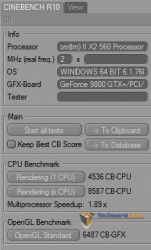 |
| CineBench R10 at stock 3.3GHz. |
The resulting score is a respectable one for the 560 X2. With some overclocking to tweak the processor to your rig setup and which game your playing, the score will very.
Cinebench R11.5
| Cinebench 11.5 at stock 3.3GHz |
The result of the Cinebench 11.5 of 1.81 is slightly better than the “AMD Athlon II 255 and 260” review at 1.69, though the difference is just the difference of a few tenths.
Benchmarks Continued:
Passmark:
PassMark Performance Test is an award winning PC hardware benchmark utility that allows anyone to quickly assess the performance of their computer and compare it to a number of standard ‘baseline’ computer systems.
| Stock 3.3GHz | Scoring at stock 3.3GHz |
The score is a respectable 1,045.1, which for a dual core processor that cost a mere $105 is very impressive in the market at the time of this review.
3DMark 06:
While this one is far more GPU dependent, 3DMark can give some insight into how the CPU affects gaming performance:
| Stock 3.3GHz | Overclocked to 3.8Ghz |
We were able to overclock the processor to 3.8GHz and it stayed stable to complete a full run of benchmarks and resulted in a very nice increase in the score. Also noteworthy is when the benchmark got to the point where the rendering was be handled by the processor, for the first time, I saw a score higher than 1fps (3fps was seen for a split second).
Conclusion:
The AMD Phenom ™ II 560 X2 BE is a real performer and for the price, a real value. Many of the gaming titles currently on the market do not utilize more than two cores so it is still viable to purchase dual core processors and expect that additional core would result in less return on your money for gaming applications. Additionally dual core cpu’s like the Phenom II 560 are ideal for environments not seeking high end workstations and instead focusing upon cost efficient machines for offices, educational settings, and small to medium businesses.
It is important to note that the Phenom II 560 is a very capable overclocker that returns excellent results for a mere $105 pricetag. At this low cost it is very tough to pass up for even the enthusiast. Using the ROG-connect port on our ASUS Crosshair IV Formula Motherboard we were able to push the 560 X2 to speeds of 4.3GHz and even higher when only one core was enabled. This is a decent processor which can compete with much more expensive Intel parts with a price premium of $80 and $100 more. In our book if you can pay less and get the same or better performance we’d do it every time.
Techwarelabs Reviews
|
AMD Athlon II x3 440 3.0GHz AMD Phenom II x6 1090TAMD Phenom II x6 1075T 3.0GHz: Super fast processing for less |
Additional Reviews
|
AMD Phenom 1090890FX chipset and Phenom 1090T |
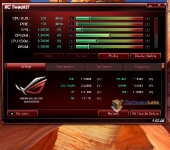
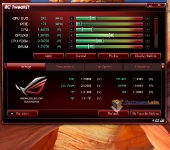
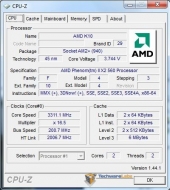
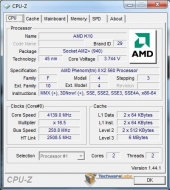
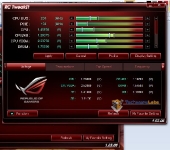


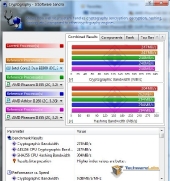
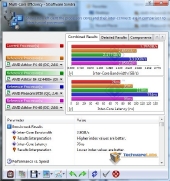
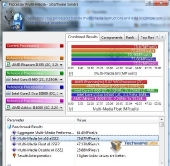
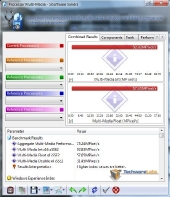



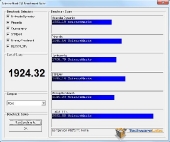
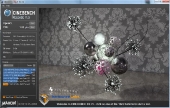
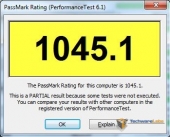
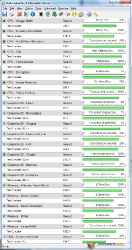
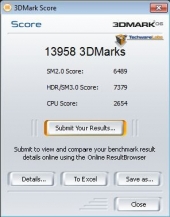
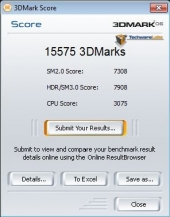

Buying this AMD Phenom II is a very good bargain. For instance, if you do not have enough cash to buy high-end, then you can use lower versions. Once your budget for upgrade increases, you need not to replace the motherboard of your system.and also
Hyper-threading technology allows each processor to run two threads simultaneously making a dual-core processor run like quad core.
http://www.techyv.com/article/amd-phenom-ii-x2-560-black-editions-compared-intel-core-cpus